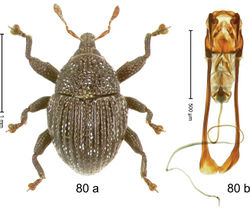Trigonopterus sordidus
| Notice: | This page is derived from the original publication listed below, whose author(s) should always be credited. Further contributors may edit and improve the content of this page and, consequently, need to be credited as well (see page history). Any assessment of factual correctness requires a careful review of the original article as well as of subsequent contributions.
If you are uncertain whether your planned contribution is correct or not, we suggest that you use the associated discussion page instead of editing the page directly. This page should be cited as follows (rationale):
Citation formats to copy and paste
BibTeX: @article{Riedel2013ZooKeys280, RIS/ Endnote: TY - JOUR Wikipedia/ Citizendium: <ref name="Riedel2013ZooKeys280">{{Citation See also the citation download page at the journal. |
Ordo: Coleoptera
Familia: Curculionidae
Genus: Trigonopterus
Name
Trigonopterus sordidus Riedel sp. n. – Wikispecies link – ZooBank link – Pensoft Profile
Diagnostic description
Holotype, male (Fig. 80a). Length 1.98 mm. Color black; antenna and tarsi light ferruginous; tibiae, femora, and head deep ferruginous. Body subovate; in dorsal aspect with distinct constriction between pronotum and elytron; in profile evenly convex. Rostrum rugose-punctate; epistome weakly, transversely swollen. Pronotum deeply rugose-punctate, each puncture containing one scale; majority of scales narrow, ochre; few scales almond-shaped, white. Elytra with striae deeply impressed; strial punctures with same set of scales as pronotum; intervals costate, largely subglabrous, but with scattered scales. Femora dentate. Metafemur with simple dorsoposterior edge, subapically with stridulatory patch. Aedeagus (Fig. 80b) complex, laterally incised, with dorsolateral well-sclerotized flanges; apex subtruncate, sparsely setose. Endophallus with various sclerites. transfer apparatus drop-shaped, apically pointed; ductus ejaculatorius with weak bulbus. Intraspecific variation. Length 1.86–2.28 mm. Color ferruginous in some possibly teneral specimens. Scattered scales on elytra more or less numerous.
Material examined
Holotype (MZB): ARC0736 (EMBL # HE615419), WEST NEW GUINEA, Jayawijaya Reg., Jiwika, Kurulu, S03°57.161', E138°57.357', 1875 m, 24-XI-2007, sifted. Paratypes (ARC, SMNK, ZSM): WEST NEW GUINEA, Jayawijaya Reg., Jiwika, Kurulu: 1 ex, ARC1715 (EMBL # HE615995), S03°57.161', E138°57.357', 1875 m, 12-VII-2010, sifted; 2 exx (1 marked ARC0080), ca. 1700–2300 m, 02-IX-1991, sifted; 9 exx, 1900–2000 m, 23-IX-1992, sifted; 2 exx, 1900–2050 m, 24-X.1993.
Distribution
Jayawijaya Reg. (Jiwika). Elevation: 1875–1900 m.
Biology
Sifted from leaf litter in montane forest.
Etymology
This epithet is based on the Latin adjective sordidus (dirty) and refers both to the occurrence of incrustations and the species´ general appearance making it hard to distinguish from a grain of dirt.
Notes
Trigonopterus sordidus Riedel, sp. n. was coded as “Trigonopterus sp. 176” by Tänzler et al. (2012)[1].
Original Description
- Riedel, A; Sagata, K; Surbakti, S; Rene Tänzler, ; Michael Balke, ; 2013: One hundred and one new species of Trigonopterus weevils from New Guinea ZooKeys, 280: 1-150. doi
Other References
- ↑ Tänzler R, Sagata K, Surbakti S, Balke M, Riedel A (2012) DNA barcoding for community ecology - how to tackle a hyperdiverse, mostly undescribed Melanesian fauna. PLoS ONE 7 (1): e28832. doi: 10.1371/journal.pone.0028832
Images
|
